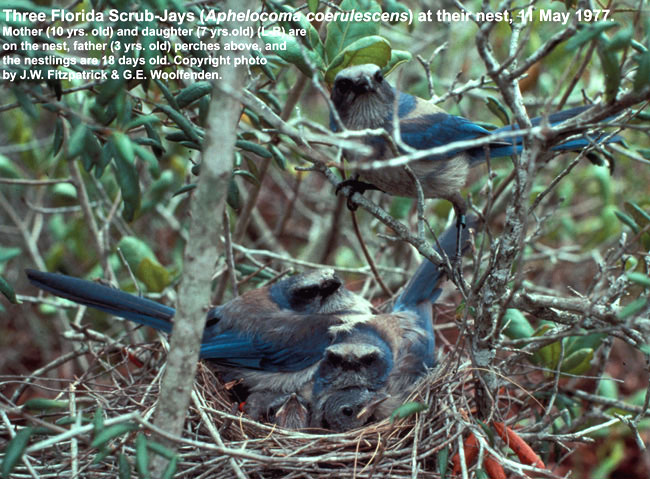 |
The EVOLUTION of MORALITY |
FRAME 10A |
 |
|
 |
> MORAL OUTCOMES (BEHAVIORAL GENETICS)
Some cases of "costly" helping are apparent only.
Helping that seems to involve cost, therefore, may justify further analysis. Some cases of costly helping are indeed apparent only. Costs that are observed in the short-term may be balanced by benefits in the long-term.
 For instance, when Florida scrub jays (Aphelocoma coerulescens) reach reproductive age, they do not always "leave home" and begin their own families. Rather, they help raise their younger siblings: an apparent cost when compared with their own reproductive potential. But the context of reproduction is complex. Outcomes change with a broader perspective. A male scrub jay must have his own territory for foraging and nesting, and territory is limited. Males who stay with their father can help gradually expand the father's territory, which is eventually split between father and son. This way the son is better able to secure good territory. Females, by contrast, compete for males with the best territories. A female who can wait for opportunity is able to select a better mate. In each case, the scrub jay actually benefits reproductively in the long-term by staying at home and helping their parents reproduce in the short-term (Woolfenden and Fitzpatrick 1978, 1984). Such reproductive helpers are found widely — in black-backed jackals (Canis mesomelas), cichlid fish of Lake Tanganyika (Lamprologus brichardi), grey-crowned babblers of Australia (Pomatostomus temporalis), carrion crows in northern Spain (Corvis corone corone) and many other species (Krebs and Davies 1993, pp.299-302; Clutton-Brock 2002; Baglione et al 2003). In all cases, as with observed cooperation, benefits are partly shared and ultimately outweigh any costs.
For instance, when Florida scrub jays (Aphelocoma coerulescens) reach reproductive age, they do not always "leave home" and begin their own families. Rather, they help raise their younger siblings: an apparent cost when compared with their own reproductive potential. But the context of reproduction is complex. Outcomes change with a broader perspective. A male scrub jay must have his own territory for foraging and nesting, and territory is limited. Males who stay with their father can help gradually expand the father's territory, which is eventually split between father and son. This way the son is better able to secure good territory. Females, by contrast, compete for males with the best territories. A female who can wait for opportunity is able to select a better mate. In each case, the scrub jay actually benefits reproductively in the long-term by staying at home and helping their parents reproduce in the short-term (Woolfenden and Fitzpatrick 1978, 1984). Such reproductive helpers are found widely — in black-backed jackals (Canis mesomelas), cichlid fish of Lake Tanganyika (Lamprologus brichardi), grey-crowned babblers of Australia (Pomatostomus temporalis), carrion crows in northern Spain (Corvis corone corone) and many other species (Krebs and Davies 1993, pp.299-302; Clutton-Brock 2002; Baglione et al 2003). In all cases, as with observed cooperation, benefits are partly shared and ultimately outweigh any costs.
|

 |
|
|